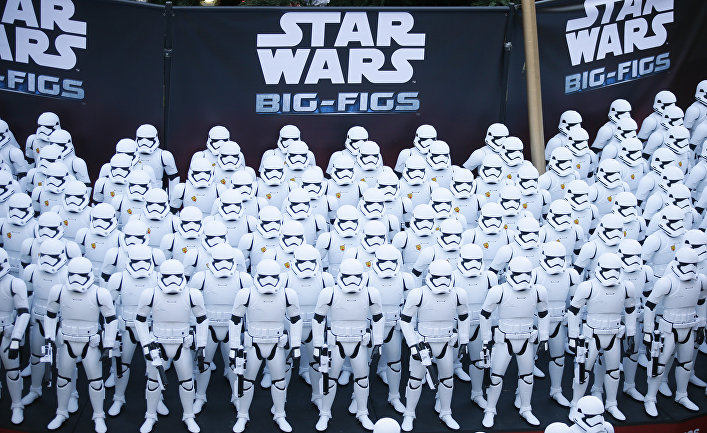Just a week after its US release, the seventh tranch of the Star Wars epic has broken new records at cinema box-offices in the USA – grossing an estimated $238 million dollars. For the French public there are still a few days before the movie hits the screens – it comes out with a slight delay by comparison with the US release – and these few days are turning into a tortured agony of waiting. “The whole cultural world in France is waiting impatiently”, Le Figaro wrote on 15 December.
Jean Raspail and Renaud Camus had the honor of warning the people of France of a Great Switch, which is going on step-by-step, in terms of the greatest secrecy. Yet perhaps this switch is not only about demographics? Isn't what we are seeing instead a switch in the fundamental basis of our culture? The search for answers leads us not through the scorching sands of Araby – but instead to Uncle Sam's metallic towers.
Have you seen the new Star Wars pic.twitter.com/vRKvS4dggj
— Darth Vader (@DepressedDarth) December 26, 2015
What is culture, if not a set of customs, beliefs and knowledge which underpins cultural unity, based on written and oral traditions? Each civilization has its own seminal works, which have, in myriad ways, formed the mindset of its people. What would the Judaic world be without the Torah? Can we imagine China without Confucius? What would the Western world be without Homer, Christian literature, and the Celtic and Germanic fables which have shaped human minds over thousands of years?
However, in 2015 there are none of us who recall Achilles or King Arthur. Not even when they turn up in mediocre films which carry a message of tolerance or peace. Nowadays the topics of conversation are Han Solo, Voldemort or Gollum – characters who go on to become role-models for a younger generation. It's very salient that our generation calls film-series which continue for decades, and gross billions at the box office, “epics” and “sagas”.
'@StarWars' On Pace to Overtake '#Avatar' as All-Time Box Office Champ https://t.co/PmL9TNjqey pic.twitter.com/1zD7A3TUsv
— TheWrap (@TheWrap) December 26, 2015
The ERTV television channel filmed reportage about Star Wars, in which they took a vox-pop of the fans who had mobbed cinemas in the hoping of getting an advance ticket. Emotions were running high, almost reaching an orgasmic pitch. However, when fans were hit with the direct question of “So, why are you a Star Wars fan?” this euphoria gave way to a mixture of confusion or oft-repeated clichés. “Well, it's, like, a cult”, or “It's the basis of our culture”, or even “Hey, it's a classic, right.”
Culture is shifting. Of course, art can't always flit between Antiquity and the Renaissance – mankind is always searching for something new. Even so, I'm not sure that Homer or Chrétien de Troyes have to make way for JK Rowling, Tolkien or James on the basis that “the times they are a-changin.”






